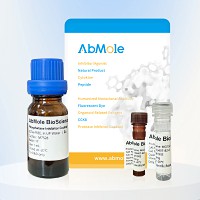All AbMole products are for research use only, cannot be used for human consumption.

Species: Mouse
Expression system: E. coli
Purity: SDS-PAGE analysis > 97%, HPLC analysis > 97%
Endotoxin: protein content < 1 EU/μg by LAL method
Theoretical molecular weight: 8 kDa
Storage and stability: After receiving, the product remains stable at -70°C or -20°C for up to 6 months. After recombination, the product should be stable at 4°C for 1 week or -20°C for 3 months. Avoid repeated freeze-thaw cycles.
Bioactivity: Fully bioactive compared to the standard. The bioactivity measured by chemotactic bioassay of human peripheral blood monocytes was in the range of 50.0-100.0 ng/ mL. Sdf-1 α and SDF-1β cdna encode precursor proteins with 89 and 93 amino acid residues, respectively. Both SDF-1α and SDF-1β are encoded by a single gene and produced by alternate splicing. The two proteins are identical except that sdF-1 β carboxyl terminus contains four amino acid residues and SDF-1α is absent. Sdf-1 /PBSF is highly conserved between species, with only one amino acid substitution between mature human and mouse proteins. Sdf-1 /PBSF works via chemokine receptor CXCR4 and has been shown to act as a chemokine for T lymphocytes, monocytes, pre-B cells, and pre-B cells, but not neutrophils. Mice lacking SDF-1 or CXCR4 were found to have impaired B lymphogenesis, bone marrow formation, vascular development, cardiogenesis, and abnormal nerve cell migration and patterns in the central nervous system.
| Solubility (25°C) | Reconstitute the lyophilized powder in sterile distilled water or aqueous buffer containing 0.1 % BSA to a concentration of 0.1-1.0 mg/ml. |
| Storage |
Stable for up to 6 months at -70°C or -20°C. Upon reconstitution, the product should be stable for up to 1 week at 4°C or up to 3 months at -20°C. |
| Related Cytokines and Growth Factors Products |
|---|
| Recombinant Human GDF-15 Protein (HEK293 N-hFc)
Growth-differentiation factor 15 (GDF15), also known as MIC-1, is a secreted member of the transforming growth factor (TGF)-β superfamily. GDF-15 has a role in regulating inflammatory and apoptotic pathways in injured tissues and during disease processes. GDF-15 overexpression arising from an expanded erythroid compartment contributes to iron overload in thalassemia syndromes by inhibiting hepcidin expression. |
| Recombinant Human FGFR1 Protein (HEK293, C-His)
FGFR1, also known as CD331, is a full-length representative protein consists of an extracellular region, composed of three immunoglobulin-like domains, a single hydrophobic membrane-spanning segment and a cytoplasmic tyrosine kinase domain. |
| Recombinant Human FGFR2 Protein (HEK293, C-His)
FGFR2, also known as CD332, acts as cell-surface receptor for fibroblast growth factors and plays an essential role in the regulation of cell proliferation, differentiation, migration and apoptosis, and in the regulation of embryonic development. FGFR2 plays an essential role in the regulation of osteoblast differentiation, proliferation and apoptosis, and is required for normal skeleton development. It also promotes cell proliferation in keratinocytes and imature osteoblasts, but promotes apoptosis in differentiated osteoblasts. |
| Recombinant Mouse BMP-4 Protein (E. coli, C-His)
Bone Morphogenetic Protein-4 (BMP-4) is a critical signaling molecule required for the early differentiation of the embryo and establishing of a dorsal-ventral axis. BMP-4 is secreted from the dorsal portion of the notochord, and it acts in concert with sonic hedgehog to establish a dorsal-ventral axis for the differentiation of later structures. |
| Recombinant Human Coagulation Factor X (HEK293, C-Fc)
Coagulation factor X, belongs to the peptidase S1 family. Coagulation factor X is initially synthesized in the liver. Coagulation factor X is a vitamin K-dependent glycoprotein that converts prothrombin to thrombin in the presence of factor Va, calcium and phospholipid during blood clotting. |
All AbMole products are for research use only, cannot be used for human consumption or veterinary use. We do not provide products or services to individuals. Please comply with the intended use and do not use AbMole products for any other purpose.


Products are for research use only. Not for human use. We do not sell to patients.
© Copyright 2010-2024 AbMole BioScience. All Rights Reserved.
